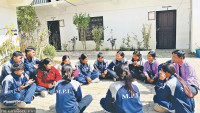National
Nepali workers aren’t much hopeful about Qatar labour reforms
Qatar says it would be ending the exploitative Kafala system and set a minimum wage for foreign workers to protect their rights..jpg&w=900&height=601)
Chandan Kumar Mandal
When hundreds of Nepali workers, employed at a leading company in Qatar, went on a strike in August after their employer did not issue them valid identity cards, a migrant worker from Dhanusha also actively joined the protest.
The weeks-long protest ended after the company—Bandary International Group, agreed to provide identity card to workers.
“Without the identity card, we could do nothing. Because of the protest, the company issued ID cards to almost everyone,” the Nepali worker, who did not wish to disclose his identity fearing consequences, told the Post. “Now the company has provided valid cards [but] workers do not have insurance. Without a health card, we cannot go for treatment when we fall sick.”
The migrant worker, who has been working as an air-conditioner installer in Qatar for nearly two years now, says nothing much has improved for migrant workers like him.
The workers are waiting for the medical card after the Qatari government announced last week that it would be introducing significant reforms in its labour laws, especially targeting the country's two-million strong foreign labour force.
The World Cup 2022 hosting nation has endorsed laws aimed at eventually ending the controversial kafala system and setting a non-discriminatory minimum wage for migrant workers. In determining a minimum wage, the gas-rich nation would be the first from the Gulf region to do so.
Qatar’s new legislation would see the abolition of the kafala system, described as modern slavery by the International Trade Union Confederation. Under this system, a worker is not able to either change his/her job or leave the country without the permission of the employer.
The new reforms, which will allow migrant workers to freely change jobs and return to their country without seeking no-objection certificate (NOC) from their employers, have been praised by the International Labour Organization (ILO) as “a momentous step forward in upholding the rights of migrant workers”.
The migrant worker from Dhanusha also learnt about the new reforms through social media. Many of his colleagues have no idea at all, according to him.
“Only a few of us know about the changes that will be coming. We have to wait [to see] how it will be implemented,” said the worker. “They are talking about a minimum wage, but one of my friends who was promised 900 Qatari Riyals is working for 700 riyals per month. He cannot do anything about it.”
Exploitation of migrant workers in Qatar under the Kafala or sponsorship system, unsafe working conditions, irregular and low payments, and living crammed in rooms without basic requirements have surfaced over the years.
The global pressure mounted on Qatar over the inhumane treatment of migrant workers, who have been building infrastructure such as stadiums after Qatar won the bid for hosting the FIFA World Cup 2022. Since then, Qatar has pledged reforms to improve the working conditions of expatriate workers in the country. However, nothing much has happened.
An investigative report by Westdeutscher Rundfunk Köln (WDR), a German public broadcaster, has revealed that Nepali workers, who were working on World Cup projects, were still exploited in Qatar.
“Some companies are really strict about fair treatment of migrant workers. However, as a whole, Qatar is good at projection rather than implementation,” Manoj Sah, who has previously worked as a senior accountant in Qatar, told the Post.
“Many workers remain, and return, unpaid for months. Have you ever heard that the Qatari government paid them? Instead, they penalise the company, but it never helps the workers in getting paid.”
According to a new research by Amnesty International, thousands of migrant workers are still waiting in vain for unpaid wages and compensation, despite Qatar’s promises to improve workers’ rights.
The report called ‘All Work, No Pay: The Struggle Of Qatar’s Migrant Workers For Justice’ revealed how hundreds of migrant workers working for three construction and cleaning companies have given up on justice and returned home penniless since March 2018.
In an op-ed for the Post, Jeevan Baniya of the Centre for the Study of Labour and Mobility at Social Science said the reforms can certainly work in favour of Nepali migrant workers, especially domestic workers and casual workers in Qatar, whose total number there was estimated at more than 1.3 million as of the fiscal year 2017-18.
“The reforms look favourable,” wrote Baniya. “However, under what terms and conditions will the workers sign a new contract, if one switches the employer and how the recruitment cost is borne will have to be closely assessed and monitored in order to realise the actual benefits.”
Returnee migrant workers like Sah also say that taking advantage of the reforms would be difficult for unskilled and uneducated workers.
“The process of changing a job would be tough, for sure. The worker will have to visit the Ministry of Interior Qatar in case the company will not give the NOC,” said Sah, originally from Janakpur. “There are many issues like transportation, language and legal aspects for low-level workers. For someone who works at the managerial level, it will be relatively easier. But, for ordinary workers who live in camps, it is still a hard stone to bite.”
The reforms will come into force from January 2020. The minimum wages will also be decided later this year.
“We have to wait and watch until it is formally implemented. Many companies are sending workers back already,” said the migrant worker from Dhanusha. “The government often comes up with such promises. But the companies do not care about such rules. I am not much hopeful.”




 16.4°C Kathmandu
16.4°C Kathmandu














